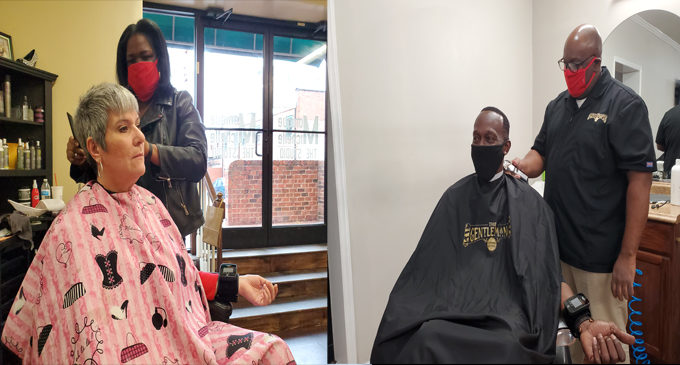Barbers and stylists care about your hair and your health

By Sarah Fedele, American Heart Association
April is National Minority Health Month, but our participating Hair, Heart and Health barbers and stylists are helping their clients be healthier – all year long!
Through this program, salon and barbershop staff have been trained, blood pressure checks are being encouraged, and stylists and barbers are engaging their clients with heart health information to help reduce risk factors for heart disease and stroke.
The American Heart Association’s Hair, Heart & Health program is working with eight local barbershops and salons including Gentleman’s Grooming Lounge, Blend Masters, and Monique Michelle the Studio beauty salon in Winston-Salem. In Guilford County, The Hot Seat Studio Salon, United Barbershop, Marte’s Barber Shoppe, Heads Up Barbers, and Glenwood Barr-ber Shop are participating.
Hair, Heart & Health is part of a statewide initiative with the American Heart Association and Blue Cross Blue Shield of NC (Blue Cross NC) to improve heart health among systematically disadvantaged populations in North Carolina.
Live Chair Health will also now be joining with Hair, Heart & Health in the Triad – making health conversations in the barber’s chair even more possible.
With Live Chair Health, barbers and stylists will perform quick and easy health screenings for their clients before their haircut and then help their client complete a short health questionnaire on the Live Chair Health kiosk or the Live Chair app.
“We are on a mission to save the lives of African Americans by addressing chronic health conditions through the trusted relationships established between hair professionals and their clients,” shared Andrew Suggs, CEO and founder of Live Chair Health. “Together with the American Heart Association, we are elevating barbers and stylists into becoming not only leaders in their community, but lifesavers for those who sit in their chairs.”
Why is this so important?
“Barbershops are pillars in the neighborhood and imperative to the education of our people. We encourage our neighbors to come in, sit and talk about everything related to having a healthy family,” shared Derek Brooks, owner of Gentleman’s Grooming Lounge in Winston-Salem.
“As a cosmetologist, we’re able to advise our clients about hair, skin and nails. Now, with the parallel for heart health, we will have some training to also advise our clients to have a healthier lifestyle,” said Monique Parks, owner/operator of Monique Michelle the Studio in Winston-Salem.
“Our clients are very comfortable in the chair and overall health conversations happen naturally. Now with the materials, information and training from the American Heart Association, we can be even more factual and helpful,” said Charlz Henry, stylist from The Hot Seat Studio Salon in Greensboro.
Barbershops and salons have always been pillars of African American communities. More often than not, barbers and hairstylists serve in dual roles of therapist and hairdresser. Their clients are like family and together, they share a history. When health issues arise in conversation, it’s important that accurate information is being shared. With the help of the American Heart Association, Blue Cross NC and Live Chair Health, the stylists in the participating shops are trained and now will have all the resources they need for healthy conversations at their fingertips.
Heart disease is the leading cause of death for Americans, but deaths from the disease are higher among Black Americans than their white counterparts. Due to historic marginalization and systemic racism, health disparities have existed within the African American community for decades. In the U.S., African Americans have a higher prevalence of high blood pressure than other racial or ethnic groups. Sixty percent of African American men and 57% of Black women have cardiovascular disease. Black individuals also have a higher risk of first-ever ischemic strokes. Increased prevalence of high blood pressure, an increased likelihood of resistant hypertension, increased overweight and obesity rates, and increased prevalence of prediabetes, make the focus of this awareness, education and preventative program so vital.
Follow this North Carolina health equity journey and read local community impact stories from program participants throughout the year at www.heart.org/ProjectCommunity.









